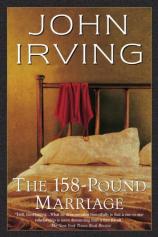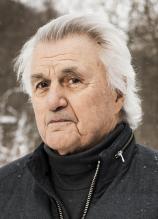Excerpt
Excerpt
The 158-Pound Marriage

1.
The Angel Called
"The Smile of Reims"
My wife, Utchka (whose name I sometime ago shortened to Utch), could teach patience to a time bomb. With some luck, she has taught me a little. Utch learned patience under what we might call duress. She was born in Eichbüchl, Austria --- a little village outside the proletarian town of Wiener Neustadt, which is an hour's drive from Vienna --- in 1938, the year of Anschluss. When she was three, her father was killed as a Bolshevik saboteur. It is unproven that he was a Bolshevik, but he was a saboteur. By the end of the war, Wiener Neustadt would become the largest landing field in Europe, and the unwilling site of the German Messerschmitt factory. Utch's father was killed in 1941 when he was caught in the act of blowing up Messerschmitts on the runway in Wiener Neustadt.
The local SS Standarte
of Wiener Neustadt paid a visit to Utch's mother in Eichbüchl after Utch's father had been caught and killed. The SS men said they'd come to alert the village to the "seed of betrayal" which obviously ran thick in Utch's family. They told the villagers to watch Utch's mother very closely, to make sure she wasn't a Bolshevik like her late husband. Then they raped Utch's mother and stole from the house a wooden cuckoo clock which Utch's father had bought in Hungary. Eichbüchl is very close to the Hungarian border, and the Hungarian influence can be seen everywhere.
Utch's mother was raped again, several months after the SS left, by some of the village menfolk who, when questioned about their assault, claimed they were following instructions of the SS: watching Utch's mother very closely, to make sure she wasn't a Bolshevik. They were not charged with a crime.
In 1943, when Utch was five, Utch's mother lost her job in the library of the monastery in nearby Katzelsdorf. It was suggested that she might be foisting degenerate books on the young. Actually, she was guilty of stealing books, but they never accused her of that, nor did they ever find out. The small stone house Utch was born in --- on the bank of a stream that runs through Eichbüchl --- connected to a chicken house, which Utch's mother maintained, and a cow barn, which Utch cleaned every day from the time she was five. The house was full of stolen books; it was actually a religious library, thought Utch remembers it more as an art library. The books were huge poster-sized records of church and cathedral art --- sculpture, architecture and stained glass --- from sometime before Charlemagne through the late Rococo.
In the early evenings as it was getting dark, Utch would help her mother milk the cows and collect the eggs. The villagers would pay for the milk and eggs with sausage, blankets, cabbages, wood (rarely coal), wine and potatoes.
Fortunately, Eichbüchl was far enough away from Messerschmitt plant and the landing field in Wiener Neustadt to escape most of the bombing. At the end of the war the Allied planes dumped more bombs on that factory and landing field than on any other target in Austria. Utch would lie in the stone house with her mother in the blacked-out night and hear the crump! crump! crump!
of the bombs falling in Wiener Neustadt. Sometimes a crippled plane would fly low over the village, and once Haslinger's apple orchard was bombed in blossom time; the ground under the trees was littered with apple petals thicker than wedding confetti. This happened before the bees had fertilized the flowers, so the fall apple crop was ruined. Frau Haslinger was found hacking at herself with a pruning hook in the cider house, where she had to be restrained for several days --- tied up in one of the large, cool apple bins until she came to her senses. During her confinement, she claimed, she was raped by some of the village menfolk, but this was considered a fantasy due to her derangement at the loss of the apple crop.
It was no fantasy when the Russians got to Austria in 1945, when Utch was seven. She was a pretty little girl. Her mother knew that the Russians were awful with women and kind to children, but she didn't know if they would consider Utch a woman or a child. The Russians came through Hungary and from the north, and they were especially fierce in Wiener Neustadt and its environs because of the Messerschmitt plant and all the high officers of the Luftwaffe they found around there.
Utch's mother took Utch to the cow barn. There were only eight cows left. Going over to the largest cow, whose head was locked in it milking hitch, she slit the cow's throat. When it was dead, she unfastened the head from the milking hitch and rolled the cow on her side. She cut open the belly of the cow, pulled out the intestines and carved out the anus, and then made Utch lie down in the cavity between the great cow's scooped-out ribs. She put as much of the innards back into the cow as would fit, and took the rest outside in the sun where it would draw flies. She closed the slit belly-flaps of the cow around Utch like a curtain; she told Utch she could breathe through the cow's carved out anus. When the guts that had been left in the sun drew flies, Utch's mother brought them back inside the cow barn and arranged them over the head of the dead cow. With the flies swarming around her head, the cow looked as if she'd been dead a long time.
Then Utch's mother spoke to Utch through the asshole of the cow. "Don't you move or make a sound until someone finds you." Utch had a long, slim wine bottle filled with chamomile tea and honey, and a straw. She was to sip it when she was thirsty.
"Don't you move or make a sound until someone finds you," said Utch's mother.
Utch lay in the belly of the cow for two days and two nights while the Russians wasted the village of Eichbüchl. They butchered all the other cows in the barn, and they brought some women to the barn too, and they butchered some men in there as well, but they wouldn't go near the dead cow with Utch inside her because they thought the cow had been dead a long time and her meat was spoiled. The Russians used the barn for a lot of atrocities, but Utch never made a sound or moved in the belly of the cow where her mother had placed her. Even when she ran out of chamomile tea and the cow's intestines dried and hardened around her --- and all the slick viscera clung to her --- Utch did not move or make a sound. She heard voices; they were not her language and she did not respond. The voices sounded disgusted. The cow was prodded; the voices groaned. The cow was tugged and dragged; the voices grunted --- some voices gagged. And when the cow was lifted --- the voices heaved!
--- Utch slipped out in a sticky mass which landed in the arms of a man with a black-haired mustache and a red star on his grey-green cap. He was Russian. He dropped to his knees with Utch in his arms and appeared to pass out. Other Russians around him took off their caps; they appeared to pray. Someone brought water and washed Utch. Ironically, they were the sort of Russians who were kind to children and in no way thought Utch was a woman; at first, in fact, they thought she was a calf.
Piece by piece, what happened grew clear. Utch's mother had been raped. (Almost everyone's mother and daughter had been raped. Almost everyone's father and son had been killed.) Then one morning a Russian had decided to burn the barn down. Utch's mother had begged him not to, but she had little bargaining power; she had already been raped. So she had been forced to kill the Russian with a trenching spade, and another Russian had been forced to shoot her.
Piece by piece, the Russians put it together. This must be the child of that woman who didn't want the barn burned down, and it was because...The Russian who'd caught the slimy Utch in his arms as the putrid cow was thrown up on a truck figured it out. He was an officer, too, a Georgian Russian from the banks of the eely Black Sea; they have queer phrases and lots of slang there. One of them is utch --- a cow. I have asked around, and the only explanation is that utch, to various offhanded Georgians, imitates the sound a cow makes when she is calving. And utchka?
Why, that is a calf, of course, which is what the Georgian officer called the little girl who was delivered to him from the womb of the cow. And it is natural, now, that a woman in her thirties would no longer be an Utchka, so I call her Utch.
Her real name was Anna Agati Thalhammer, and the Georgian officer, upon hearing the history of Utch's family in the good village of Eichbüchl, took his Utchka with him to Vienna --- a fine city for occupying, with music and painting and theater, and homes for orphans of war.
When I think of how often I told Severin Winter this story, I could break my teeth! Over and over again, I told him he must understand that, above all, Utch is loyal. Patience is a form of loyalty, but he never understood that about her.
"Severin," I used to day, "she is vulnerable for the same reason that she is strong. Whatever she puts her love in, she will trust. She will wait you out, she will put up with you-forever-if she loves you.
Excerpted from The 158-Pound Marriage © Copyright 2012 by John Irving. Reprinted with permission by Ballantine Books. All rights reserved.
The 158-Pound Marriage
- paperback: 176 pages
- Publisher: Ballantine Books
- ISBN-10: 0345417968
- ISBN-13: 9780345417961







